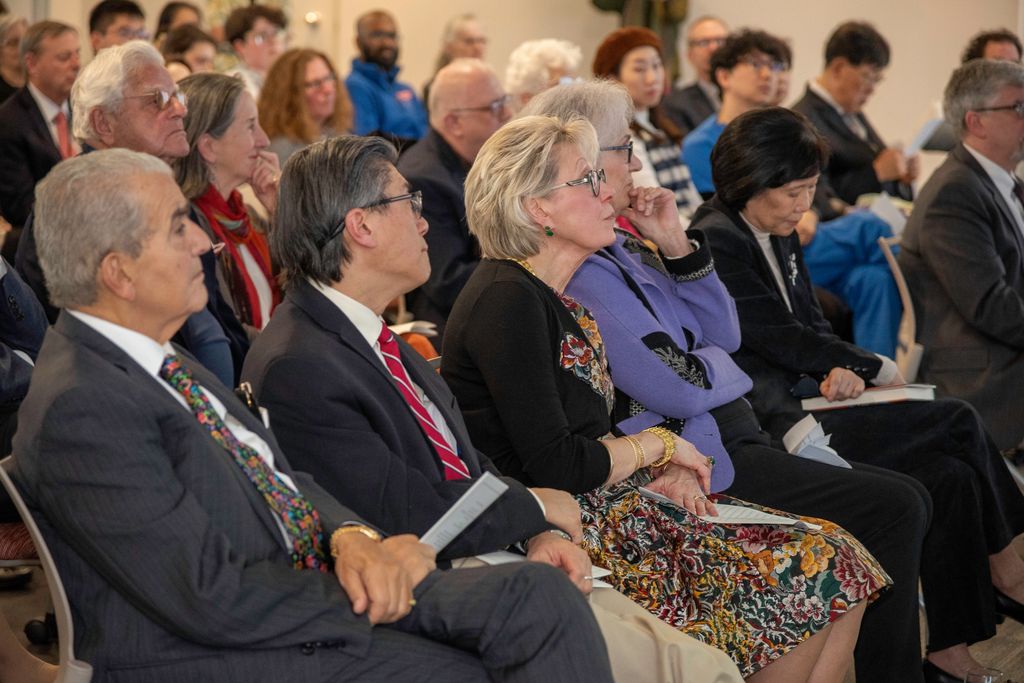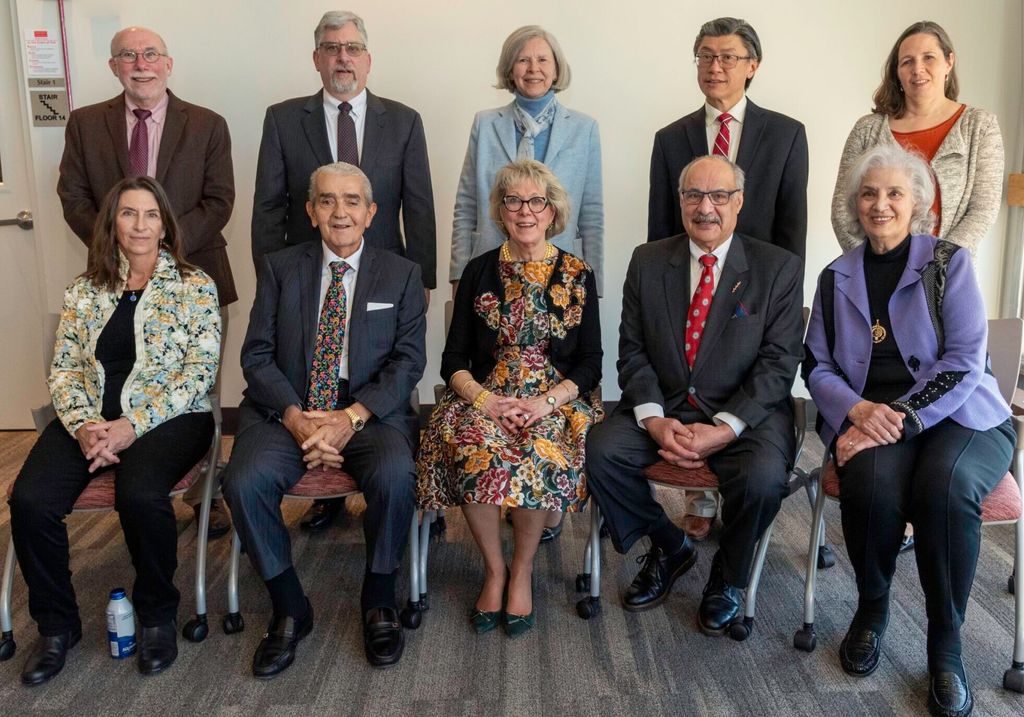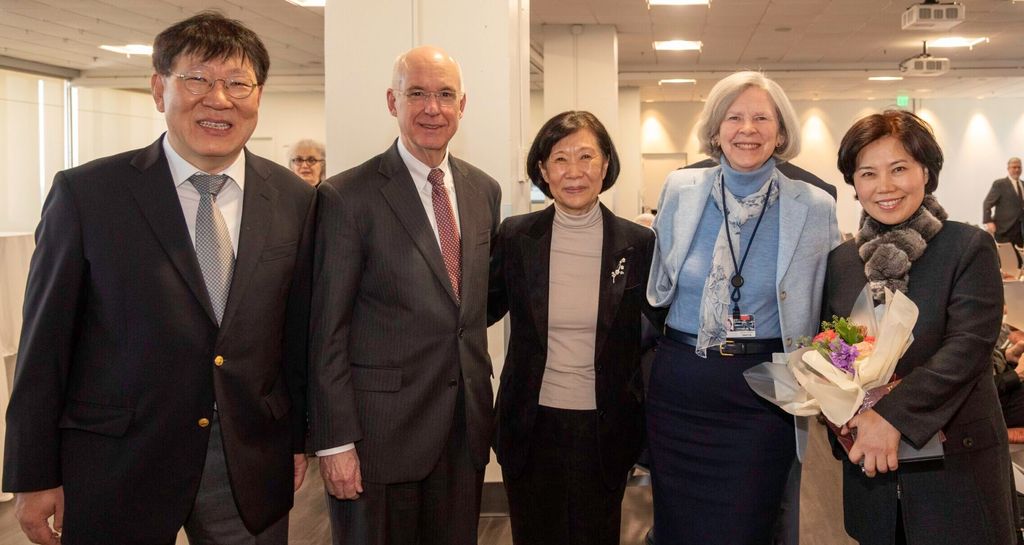Edward Avedisian Professorships Awarded at Installation Ceremony
 Donor Pamela Avedisian listening to presentation at installation ceremony for five Avedisian professorships
Donor Pamela Avedisian listening to presentation at installation ceremony for five Avedisian professorships
Five faculty were named recipients of Edward Avedisian Professorships in a March 12 ceremony held in Hiebert Lounge, which included online viewers both in the U.S. and abroad. The professorships were funded out of the $25 million set aside from the transformational $100 million gift from the late Edward Avedisian and his wife Pamela in 2022, which resulted in the renaming of the school as the Aram V. Chobanian & Edward Avedisian School of Medicine.
Last April, Nancy Sullivan, ScD, director of the National Emerging Infectious Diseases Laboratories, and Venetia (Vanna) Zachariou, PhD, chair of pharmacology, physiology & biophysics, were installed as the initial recipients of Edward Avedisian Professorships.
“We’re abidingly grateful to Ed and to Pamela Avedisian for their generosity and the recognition that a great medical school is a precious renewable resource for our society and for the world,” said Boston University President ad interim Kenneth Freeman.
Freeman noted that these five endowed chairs did not bear the Avedisian name but had been selected to honor others.
“We chose to name these professorships to honor individuals who not only achieved great success in their medical careers but have continually used that success to help others,” said Pamela Avedisian. “We want them to inspire the current and future generations of medical students.”
“In medicine, we often say that we stand on the shoulders of giants and today you will be introduced to 10 remarkable leaders in medical sciences,” said Dean and BUMC Provost Karen Antman, MD, who chaired the installation ceremony.
 Newly named Avedisian professors (Standing l-r) David Harris, Andrew Taylor, Medical School Dean Karen Antman, Toby Chai, and Rachel Fearns (missing from photo is Hee-Young Park ; Seated, representing named professorships are Housepian spokesperson Jean Housepian, Sarkis Kechejian, Donor Pamela Avedisian, Richard Babayan, Carolann Najarian
Newly named Avedisian professors (Standing l-r) David Harris, Andrew Taylor, Medical School Dean Karen Antman, Toby Chai, and Rachel Fearns (missing from photo is Hee-Young Park ; Seated, representing named professorships are Housepian spokesperson Jean Housepian, Sarkis Kechejian, Donor Pamela Avedisian, Richard Babayan, Carolann Najarian
Toby Chai, MD, professor and chair of the department of urology, was named the inaugural Richard K. Babayan, MD, Professor of Urology. Babayan, professor emeritus and former chair of urology, retired in 2022 after 43 years at the school. A recipient of numerous awards, he was the first in Boston to do a robot-assisted radical prostatectomy in 2005.
“I’m humbled by this experience and very grateful,” said Babayan, who introduced Chai, the urologist in chief at Boston Medical Center and president of Boston Medical Center Urologists, Inc. He held the John D. Young Professorship in Urology at the University of Maryland School of Medicine and was vice chair of research in urology at Yale University School of Medicine.
Chai, who titled his remarks ‘Gratitude with a Purpose,’ said the professorship was about more than one person.
“It really is to help our department continue our academic mission to make it the best that it can be,” he said.
Rachel Fearns, PhD, chair of virology, immunology & microbiology, was named the Ernest Barsamian, MD, Professor.
Barsamian grew up poor in Syria, became a professor of surgery and faculty dean at Harvard Medical School, invented one of the early heart-lung machines, and was the chair of cardiac and thoracic surgery, chair of surgical services and chief of staff at the Boston Veterans Administration Medical Center.
“From the earliest days of his medical career, our father worked tirelessly to balance leading edge prowess in medicine, particularly surgery, with the compassion and humanity that marks the successful physician,” said his son Peter Barsamian.
From the U.K., Fearns holds a PhD from the University of St. Andrews. Her research focuses on the transcription and replication of RNA viruses, like respiratory syncytial virus (RSV) and emerging pathogens like the Marburg, Ebola and Nipah viruses. Fearns frequently works with the pharmaceutical industry on small molecule polymerase inhibitors that help fight diseases by inhibiting their functionality.
“It’s such an honor to be the inaugural Barsamian chair. I’m excited to take this on,” said Fearns. “My parents are educators and they imbued in me the sense that education is (allows) you to make choices in life.” She thanked her mentors, including Ronald Corley, PhD, recently retired as chair of virology, immunology & microbiology, who “built a wonderful department here,” and the department faculty who have helped to mentor her students and elevate her science.
 Newly named Avedisian professor Hee-Young Park (center) with family members (l-r) Hee-Sup Kim, BU President Kenneth Freeman, Hee-Young Park, Dean Karen Antman, Eun Wha Choi
Newly named Avedisian professor Hee-Young Park (center) with family members (l-r) Hee-Sup Kim, BU President Kenneth Freeman, Hee-Young Park, Dean Karen Antman, Eun Wha Choi
Hee-Young Park, PhD, professor and chair of medical sciences and education, professor of dermatology and associate dean for faculty affairs, was named the Carolann S. Najarian, MD, Professor. Najarian, MD’80, worked most of her career in private practice. In response to the devastating 1988 Armenian earthquake, she established the Armenian Health Alliance, delivering medicine and medical supplies, established a primary care center and a center for expectant women. She was assistant medical director at Middlesex County Hospital and instructor in clinical medicine at Harvard Medical School.
“I know this chair will add significantly to the education of student here, enriching their medical education and preparing them to go out into a culturally diverse world to care for patients,” Najarian said.
Park said it took a global community to raise her and get her to where she is today. Born in Korea, she credited her father with believing that education was for all, including women. Arriving in Arkansas at age 15, by herself, to pursue science education, Park said she was grateful to the Blyholder family in Fayetteville, Arkansas, who sponsored and hosted her.
“Today would not be possible without friends, families and colleagues,” said Park.
Andrew Taylor, PhD, associate dean of research and professor and vice chair of research in ophthalmology, was named the Sarkis J. Kechejian, MD, Professor. He is an internationally known researcher in ocular immune privilege, ocular autoimmune disease and the role of melanocortin pathways in regulating inflammation and immunity. He thanked the Avedisian family, his family, students, colleagues, research collaborators and gave a tribute to his mentors, J. Wayne Streilein, MD, and Joan Stein-Streilein, PhD.
Kechejian, MD’63, is the president of K Clinics in Texas, CEO and chairman of Alliance Health and president of the Kechejian Foundation. He said his mother taught him “the necessity of being involved in the community…and instilled in me the concern for helping others.”
He has been a longtime advocate for increased scholarships for BU medical students, especially to ease the financial considerations that exacerbated a chronic shortage of primary care physicians and other non-surgical specialties and is a recipient of the school’s Distinguished Alumnus Award for Service to the School. The Avedisian gift included $50 million for student scholarships and Kechejian said the scholarship fund has grown from $5 million in 1996 to $150 million today.
The Edgar Minas Housepian, MD, Professorship went to David A. Harris, MD, PhD, chair of biochemistry & cell biology since 2009. He studies molecular and cellular mechanisms underlying human neurodegenerative diseases. His work on infectious prion diseases like mad cow disease, where brain proteins fold and can result in neurodegenerative effects, has helped research into other such diseases like Alzheimer’s, Parkinson’s and Huntington’s diseases.
“What I want to highlight here is the incredible foresight to use that endowment ($25 million of the Avedisian endowment is dedicated to research and teaching) to support basic research which is…always at the root of great medical discoveries,” said Harris. “I am honored to be associated with a legacy that values the pursuit of knowledge and scientific excellence.”
Housepian was a renowned neurosurgeon at New York Presbyterian Hospital and professor of neurology at Columbia University Medical School where he taught for 44 years.
“He was a very creative person with a long-range vision,” said his daughter Jean Housepian. Even with a career that began in labs, then surgery, education remained his key concern and in his retirement years he remained an advocate for international educational affiliations for medical students.
View all posts